July 17, 2017
On July 7, 2017, H.E. Ms. Elayne Whyte Gomez, Ambassador Extraordinary and Plenipotentiary and Permanent Representative of Costa Rica to the UN in Geneva—and alumna of the Middlebury Institute for International Studies at Monterey (formerly known as the Monterey Institute of International Studies, or MIIS)—made history. After months of consultations and two rounds of intense negotiations, she successfully presided over the negotiation at the United Nations of the Treaty on the Prohibition of Nuclear Weapons. Facing extraordinary time pressure and, at times, contentious debate, Amb. Whyte facilitated the adoption of this landmark agreement by a vote of 122 nations in favor, one against, and one abstention.
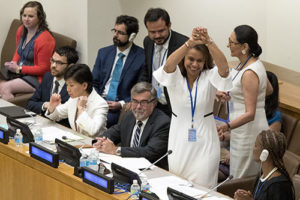 Costa Rican Ambassador
Costa Rican Ambassador
Elayne Whyte Gomez
President of the United Nations Conference to Negotiate a Legally Binding Instrument to Prohibit Nuclear Weapons
The Ambassador reacts after a vote by the conference to adopt a legally binding instrument to prohibit nuclear weapons, leading towards their total elimination. Friday, July 7, 2017 at United Nations headquarters. (AP Photo/Mary Altaffer)
Efforts to ban nuclear weapons date back to their first use in 1945, when the United States dropped two atomic bombs on the Japanese cities of Hiroshima and Nagasaki. As more countries built up nuclear arsenals and interest in civil applications of nuclear energy grew, however, the international community shifted its focus from prohibiting these weapons to limiting their spread. To this end, the United Nations concluded the Treaty on the Non-Proliferation of Nuclear Weapons (NPT) in 1968. As part of a grand bargain, the NPT commits all states party to pursue good-faith negotiations leading to nuclear disarmament, while those parties to the treaty that do not have nuclear weapons agree not to acquire them in exchange for access to safeguarded nuclear energy.
The NPT entered into force in 1970 and was extended indefinitely in 1995. Although nearly universal in adherence, the treaty has faced enduring criticism from states as well as civil society. Critics have railed against the nuclear-weapon states for not adequately fulfilling their NPT disarmament obligations, leaving in place a de facto system wherein the weapons are permitted for some, but not for others. Calls to address this perceived shortcoming grew louder following the 2010 NPT Review Conference, which refocused attention on the humanitarian impact of the use of nuclear weapons. In response, the UN General Assembly adopted Resolution 70/33 in December 2015 and established an Open-Ended Working Group (OEWG) to take forward multilateral nuclear-disarmament negotiations. Subsequently, based on the recommendations of the OEWG, the UN General Assembly adopted Resolution 71/258, which mandated negotiations on a legally binding instrument to prohibit nuclear weapons. Against this backdrop, Amb. Whyte assumed her position as President of the Prohibition Treaty negotiations in February 2017.
Amb. Whyte’s extensive experience in international diplomacy contributed significantly to her success in this position. Her engagement with issues relating to this topic dates back at least to 1991, when she began her master’s degree in International Policy Studies at MIIS. Professor Jan Black, who was also new to the institute at the time, realized as soon as they met that Amb. Whyte was going to be a “world changer.” “I hadn’t been in Monterey more than a year or so when Elayne came to the classroom,” she recalled, and it was their interactions that made her certain she had come to the right place. Prof. Black’s initial impressions were confirmed when she chaired Amb. Whyte’s master’s thesis, research she calls “brilliant, professional, and insightful.” Although the thesis itself focused on economic development, Prof. Black recalls that her former student was “always interested in diplomacy.” Amb. Whyte began to pursue this passion professionally once she received her MA in 1993: after joining the Costa Rican Foreign Service as a career diplomat in 1998, she rose to the position of Vice-Minister at the Costa Rican Ministry of Foreign Affairs and Worship two years later, in 2000. Prof. Black notes with pride that Amb. Whyte was the first woman and the youngest person ever to serve in this role, which she held through two successive administrations from different parties. She was, in Prof. Black’s words, “a celebrity right away.” The two have stayed in touch throughout Amb. Whyte’s career, and Prof. Black was thrilled but not at all surprised by her accomplishments in leading the ban treaty negotiations.
Amb. Whyte’s experience in leadership positions in diplomacy and education, buttressed by her expertise on the various issues under deliberation in New York, enabled her to successfully navigate the challenges inherent to multilateral negotiations and produce a document that prohibits the use, threat of use, testing, development, production, possession, transfer, and forward deployment of nuclear weapons. This outcome is one that proponents say reflects a paradigmatic shift in how states perceive the role of nuclear weapons in international security.
The ten-page treaty will open for signature in September 2017 and will enter into force ninety days after its ratification by fifty states. While it will almost certainly reach this threshold in a short period of time, the document’s impact on the international nonproliferation regime is far from clear: none of the nuclear-weapon possessors participated in its negotiation, and the United States, the United Kingdom, and France have already stated that they do not intend ever to become party to it.
Ambassador Whyte admirably fulfilled her mandate as Conference President; it now remains to be seen whether the lofty disarmament goals underlying the Prohibition Treaty will be realized in practice.
CNS Events and News on the TPNW
- The Role of NWFZs and the TPNW Towards Global Nuclear Weapon Elimination
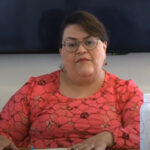 A video with speaker María Antonieta Jáquez Huacuja, Deputy General Director for Disarmament, Non-Proliferation, and Arms Control, Mexican Secretariat of Foreign Affairs.
A video with speaker María Antonieta Jáquez Huacuja, Deputy General Director for Disarmament, Non-Proliferation, and Arms Control, Mexican Secretariat of Foreign Affairs. - The Treaty on the Prohibition of Nuclear Weapons (TPNW)
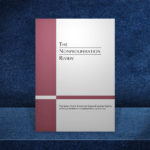 The Treaty on the Prohibition of Nuclear Weapons (TPNW): a virtual special issue of the Nonproliferation Review.
The Treaty on the Prohibition of Nuclear Weapons (TPNW): a virtual special issue of the Nonproliferation Review. - Ambassador Elayne Whyte Gomez on Negotiating the TPNW: A View from 2018
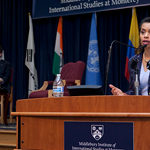 Ambassador Elayne Whyte Goméz is interviewed about her presiding over the negotiation of a legally binding instrument to ban nuclear weapons—the Treaty on the Prohibition of Nuclear Weapons (TPNW)
Ambassador Elayne Whyte Goméz is interviewed about her presiding over the negotiation of a legally binding instrument to ban nuclear weapons—the Treaty on the Prohibition of Nuclear Weapons (TPNW) - The Treaty on the Prohibition of Nuclear Weapons: What’s Next
 WEBINAR: Speakers address the treaty’s impact on nuclear disarmament and the international nonproliferation regime.
WEBINAR: Speakers address the treaty’s impact on nuclear disarmament and the international nonproliferation regime. - Ambassador Gómez Reflects on Negotiating the Nuclear Weapons Ban Treaty
 VIDEO: Seminar with Ambassador Elayne Whyte Gómez.
VIDEO: Seminar with Ambassador Elayne Whyte Gómez. - The Nuclear Weapons Prohibition Treaty: Negotiations and Beyond
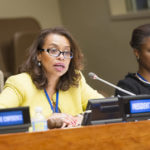 Gaukhar Mukhatzhanova examines the new nuclear disarmament treaty in this month’s Arms Control Today.
Gaukhar Mukhatzhanova examines the new nuclear disarmament treaty in this month’s Arms Control Today. - MIIS Alumna Presides Over Negotiation of Nuclear Weapons Ban Treaty
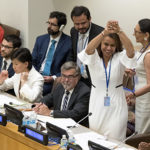 MIIS alumna Ambassador Elayne Whyte Gomez facilitated the adoption of a treaty banning nuclear weapons.
MIIS alumna Ambassador Elayne Whyte Gomez facilitated the adoption of a treaty banning nuclear weapons.
